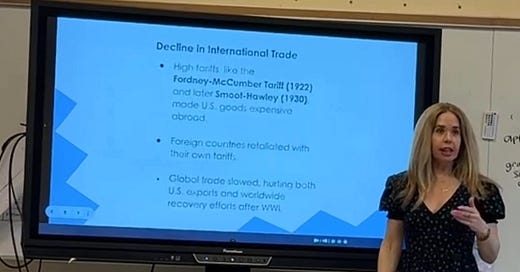Curious how U.S. tariff policy helped fuel the Great Depression?
In this Yo! Miss Lesson, I break down how protectionist policies like the Fordney-McCumber and Smoot-Hawley Tariffs backfired—deepening the global economic crisis.
And yes, as the headline astutely asserts: Trump’s new tariffs would be laughed out of a high school economics or U.S. History class.
If you appreciate my content, please consider a paid subscription
Check out the key takeaways below! 👇
🧱 Fordney-McCumber Tariff (1922)
📈 Raised tariffs to ~38.5% on many imports
🎯 Goal: Protect U.S. farmers and factories after WWI
🇪🇺 Result: Europe couldn’t sell goods to the U.S., struggled to repay war debts
🚜 Long-term effect: Hurt American farmers by reducing foreign markets for their crops
🧱 Smoot-Hawley Tariff (1930)
📈 Raised tariffs on over 20,000 imported goods—even higher than Fordney-McCumber
🎯 Goal: Protect U.S. jobs during the early Great Depression
🌍 Backfire: Other countries retaliated with tariffs on U.S. goods
🌐 Global trade collapsed, worsening the worldwide depression
🧩 How These Tariffs Connect to the Bigger Picture:
Tariffs = taxes on imports, designed to protect domestic industries by making foreign goods more expensive.
After 1913 (despite what some claim), the U.S. continued to use tariffs—especially during times of economic stress.
Fordney-McCumber (1922) and Smoot-Hawley (1930) were key examples of protectionist policies that backfired:
Other countries slapped tariffs on our goods
Global trade slowed dramatically
American farmers and exporters suffered
📚 Lesson learned (and what many economists argue today):
High tariffs can trigger trade wars and damage the global economy—especially during downturns.
📝 Bottom Line:
Tariffs like Smoot-Hawley didn’t protect the U.S.—they deepened the crisis.
Trump’s historical illiteracy and obsession with power isn’t just embarrassing—it’s dangerous.
It’s going to hurt workers, farmers, and all of us.














Share this post